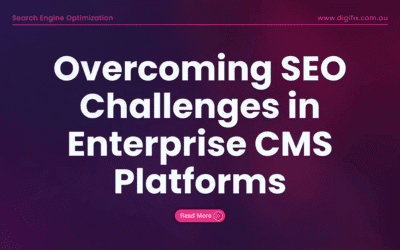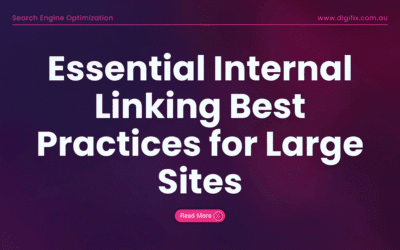In Australia, having a strong online presence is key. But are you using SEO to boost your business? Today, linking your SEO plan with your business aims is vital for success.
Your online presence must back your business goals. This way, you can increase your online visibility, get more conversions, and grow your profits. We’ll show you how to link your SEO strategy with your business goals and share tips for success. In this blog, discover how to align SEO with Enterprise Business Goals.
Key Takeaways
- Understand the importance of aligning SEO with your business objectives
- Learn how to align SEO with enterprise Business Goals
- Discover practical strategies for maximising your online presence
- Find out how to boost conversions and revenue through effective SEO
- Gain insights into achieving your business goals through SEO alignment
Understanding the Connection Between SEO and Business Objectives
SEO and business objectives are closely linked, not just by chance. They form a strategic partnership that can lead to major business wins. To make SEO work for your business, you must see how it fits into your overall strategy.
The Strategic Value of SEO for Australian Enterprises
In Australia, SEO is a powerful tool for boosting brand, getting leads, and increasing sales. By making your website search-friendly, you can get more people to visit your site. This means more chances to make sales and grow your business. Good SEO strategies also help you stay competitive in the Australian market.
Common Disconnects Between SEO and Business Goals
Even with its benefits, SEO and business goals often don’t match up. Issues include picking the wrong keywords, not checking if SEO is working for the business, and not linking SEO to business goals. To fix these problems, make sure your SEO plan matches your business aims. Also, check if your SEO efforts are really helping your business grow.
Identifying Your Enterprise Business Goals
It’s key to clearly set your business goals for a winning SEO strategy. Companies often aim to boost sales, engage more customers, or enter new markets. To make your SEO work well, you must know these goals and how SEO can help achieve them.
Types of Business Objectives That SEO Can Support
SEO can help with many business aims, like getting more website visitors, creating leads, or making your brand more visible. For example, if you want to make more money, SEO can help by getting your site to rank better for important keywords. This brings more quality leads to your site. Effective SEO integration also helps engage customers by making sure your content meets their needs.
Prioritising Goals for SEO Alignment in the Australian Market
It’s vital to set your goals in order, especially in Australia where consumer habits and search trends are different. You should study your target audience, know your competitors, and find ways to stand out. This way, you can concentrate your SEO on the goals most likely to succeed. Understanding local SEO nuances helps tailor your strategy for the Australian market.
Conducting an SEO-Business Alignment Audit
To make sure your SEO work is helping your business, you must do a detailed SEO-business alignment audit. This step checks how your SEO is doing against your business goals. It finds areas that need work and spots chances to do better.
It also looks at what your competitors are doing online in Australia. This helps you see where you stand and how to get ahead.
Assessing Current SEO Performance Against Business Metrics
First, check how your website’s SEO is doing against your business aims. Look at important numbers like how many people visit your site, how many turn into customers, and how much money you make from SEO. This shows if your SEO plan is helping your business grow.
Identifying Gaps and Opportunities
After checking your SEO, find out where you can do better. This might mean making your content better, improving your website’s tech, or getting more links to your site.
Competitive Analysis in the Australian Digital Landscape
Doing a competitive analysis is key to seeing how you compare to others in Australia. By looking at what your competitors are doing well and not so well, you can find ways to stand out. This helps you boost your SEO and get ahead of the competition.
How to Align SEO with Enterprise Business Goals
Now that you’ve set your business goals and done an SEO audit, it’s time to link your SEO strategy with your business aims. You’ll need to craft a plan that matches your business goals. This ensures your SEO work helps your business succeed.
Creating Goal-Oriented SEO Strategies
To make effective SEO strategies, focus on your business goals. Develop goal-oriented SEO strategies that bring real results. For example, if you want to boost online sales, focus on making product pages better and improving user experience.
You can do this by scaling your SEO efforts to reach more people.
Developing KPIs That Connect SEO to Business Outcomes
To see if your SEO is working, you need to track important metrics. Look at organic traffic, conversion rates, and how much money comes from SEO. This shows how your SEO is helping your business goals.
For more on what KPIs to track, check out Digifix’s guide on SEO KPIs.
Building Cross-Departmental SEO Alignment
Building cross-departmental SEO alignment is key to making sure your SEO fits with your business goals. Work well with teams like marketing, sales, and product. This teamwork helps everyone work towards the same goals.
Securing Executive Buy-in for SEO Initiatives
To get executive buy-in for SEO initiatives, show how SEO helps your business. Use data to prove SEO’s value. Highlight how SEO can increase revenue, improve brand visibility, and better engage customers.
Implementing Your Aligned SEO Strategy
Now you know how SEO fits with your business goals. It’s time to put your plan into action. This means using both on-page and off-page SEO to help your business grow.
Technical SEO Considerations for Enterprise Sites
Technical SEO is key for big sites. It makes sure search engines can find and rank your pages well. Work on making your site fast, mobile-friendly, and have good XML sitemaps.
Also, make sure your site is secure with HTTPS. It keeps user data safe and helps your ranking.
Content Strategy That Supports Business Objectives
Your content should match your business goals. Create content that’s useful and relevant to your audience. Think about making content clusters around important topics for your business and audience.
Link Building with Business Goals in Mind
Link building is important for SEO and your business. Aim for quality backlinks from trusted sources in your field. This boosts your site’s credibility and rankings.
Local SEO Tactics for Australian Enterprises
If you’re aiming for the Australian market, local SEO is vital. Make sure your business is on Google My Business and local directories. Optimize your site for local keywords and create content for your local audience.
By using these strategies, your SEO will support your business goals. This will bring more targeted traffic and help your business succeed.
Overcoming Enterprise SEO Challenges
Creating a successful SEO strategy in a big company is tough. You face IT issues and getting everyone to work together. It’s key to keep your eye on the business goals and make sure SEO helps achieve them.
Managing SEO Across Multiple Business Units
Handling SEO for different parts of the company needs a team effort. You must have a single SEO plan that everyone can follow. This means creating a place where all teams can find SEO tips and tools.
For more tips on managing SEO in big companies, check out Search Engine Journal. They have great info on SEO tools for big businesses.
Navigating IT and Development Constraints
IT and development problems can slow down your SEO work. It’s important to work closely with your IT team. Teach them why SEO is good for the business.
This teamwork helps find and solve problems. It makes sure your site works well and is easy to find online.
Balancing Short-term Demands with Long-term SEO Goals
It’s hard to balance what needs to be done now with what’s good for the future. You must pick what’s urgent and what’s important for SEO. Make sure everyone knows why SEO is important for the company’s future.
Conclusion
Aligning your SEO strategy with your business goals is key for success in Australia. Understanding how SEO helps your business is a big step forward. This means you’re ready to use SEO to increase your business’s value.
Identifying your goals and doing an SEO audit are essential steps. They help you achieve big business results. With a focused SEO plan, you can outdo your rivals and boost conversions.
To hit your SEO targets, create a custom SEO plan that matches your business goals. Set up KPIs that link SEO to business results. Also, get your teams working together on SEO. This way, you can track your SEO success and make smart choices to better your strategy.
With this guide, it’s time to start using these strategies. Doing so will help your business grow and meet your SEO goals.
FAQ
What are the key benefits of aligning SEO with enterprise business goals?
Aligning SEO with business goals can boost your brand, attract more leads, and increase sales. It helps you get more out of your online presence by focusing on your business objectives.
How do I identify the business goals that SEO can support?
To find out what SEO can help with, know your audience, check your competitors, and set your goals. SEO can help with website traffic, lead generation, and better customer interaction.
What is an SEO-business alignment audit, and why is it necessary?
An SEO-business alignment audit checks how well your SEO matches your business goals. It finds gaps and opportunities and looks at your competitors. This audit is key to making sure your SEO strategy meets your business needs and to spot areas for betterment.
How do I create goal-oriented SEO strategies that support my business objectives?
To make SEO strategies that align with your goals, set KPIs that link SEO to business results. Work with different departments and get support from executives. This ensures everyone is working towards the same goals.
What are some common challenges in implementing an SEO strategy in an enterprise environment?
Challenges include managing SEO across different units, dealing with IT and development issues, and balancing short-term needs with long-term goals. A flexible SEO strategy that adapts to changing needs can help overcome these hurdles.
How can I measure the success of my SEO strategy in achieving business outcomes?
To see if your SEO strategy is working, track KPIs like lead generation, sales, or revenue growth. This lets you know if your SEO is helping meet your business goals.
What is the role of technical SEO in aligning SEO with enterprise business goals?
Technical SEO is vital for aligning SEO with business goals. It makes sure your website is search engine friendly and easy to use. This includes improving website structure, speed, and mobile performance.
How can I ensure that my SEO strategy is aligned with my overall business objectives in the Australian market?
To align your SEO with business goals in Australia, understand your audience, study your competitors, and find ways to stand out. Use local SEO tactics and a content strategy that supports your goals to maximize your SEO efforts.





0 Comments